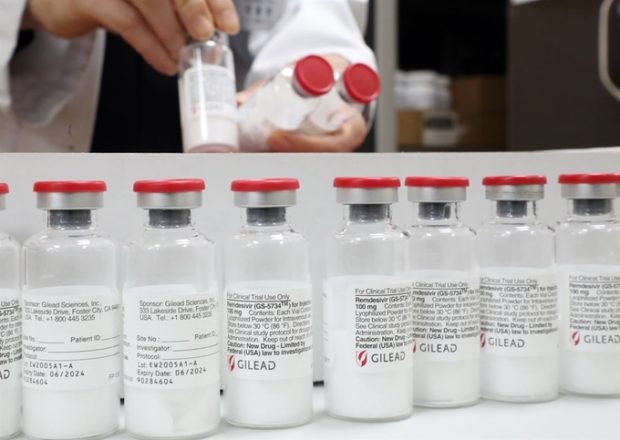Remdesivir shortens COVID-19 recovery time, but limits exist—experts
SEOUL — Remdesivir shortens recovery time for novel coronavirus patients, but the experimental drug conventionally used for treating Ebola has limited efficacy in severe cases, health experts said Monday.
Last week, the Ministry of Food and Drug Safety, South Korea’s drug safety watchdog, approved the use of Remdesivir as a treatment drug for COVID-19, allowing special imports by using its special measures procedure.
Following the approval, controversies arose on whether Remdesivir, medication developed by US pharmaceutical giant Gilead Sciences Inc., shows efficacy in Asians and COVID-19 patients with severe symptoms.
The US National Institutes of Health (NIH) earlier released a report saying that COVID-19 patients who received Remdesivir recovered faster than similar patients who received a placebo.
The trial study, the first clinical trial launched in the United States to evaluate an experimental treatment for COVID-19, was conducted on a total of 1,063 patients.
Preliminary results indicate that patients who received Remdesivir had a 31 percent faster recovery time than those who received a placebo, according to the NIH.
South Korea has yet to complete its clinical tests on Remdesivir, but the ministry cited the NIH report to allow the imports.
The medical circle welcomes the ministry’s decision, as Remdesivir is the first medication shown to have a therapeutic effect on COVID-19 patients since there is no scientifically proven treatment and no vaccine for the deadly illness.
However, some medical experts pointed out that Remdesivir would have limited efficacy in Asian patients, compared with Caucasians.
Yoon Joo-heung, a professor at University of Pittsburgh Medical Center, said that the NIH clinical study shows the drug has no efficacy in Asian patients.
Others, however, say that the result of the NIH report is due to the fact that the trials mostly involved Caucasians, as only 134 out of 1,064 participants were Asians.
“The result is due to the fact that there were not that many Asian patients participating in the trials,” said Kim Woo-ju, an infectious disease specialist at Seoul’s Korea University Hospital.
“We should consider conducting a separate study to show the efficacy of Remdesivir in Asian patients.”
Other health experts also said Remdesivir has no efficacy in COVID-19 patients with severe symptoms, such as those receiving extracorporeal membrane oxygenation (ECMO) treatment.
The NIH report also showed that 272 patients on ECMO showed no favorable result despite receiving Remdesivir. Yonhap
For more news about the novel coronavirus click here.
What you need to know about Coronavirus.
For more information on COVID-19, call the DOH Hotline: (02) 86517800 local 1149/1150.
The Inquirer Foundation supports our healthcare frontliners and is still accepting cash donations to be deposited at Banco de Oro (BDO) current account #007960018860 or donate through PayMaya using this link.
